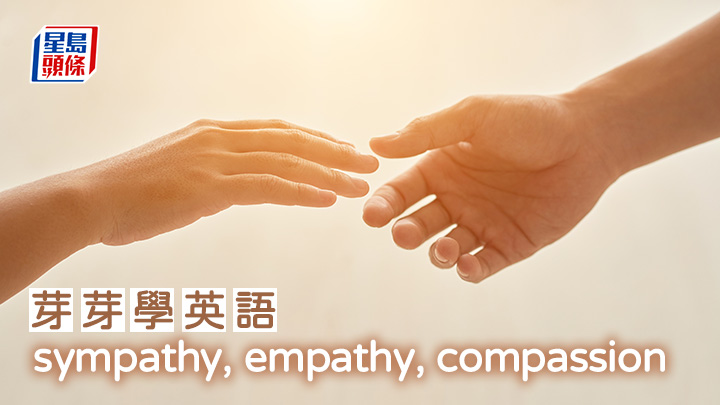陳東紅 - sympathy , empathy, compassion|芽芽學英語
發佈時間:12:08 2024-07-22 HKT

「惻隱之心,人皆有之」,每個人多多少少都有與生俱來憐憫和同情「sympathise」他人的情感,所以我們多多少少都會有同理之心:見到人受苦我們會不自覺地為那個人感到難過,例如人看悲劇會落淚,讀新聞時會為受害者感到難受,這些情緒的表現源於我們的本能情感,只是忙碌的生活和複雜的社會,這份「惻隱之心」往往變得遲鈍,個人而言,同情心「sympathy」和同理心「empathy」的分別在於前者是一種與生俱來的情感,而後者是一種有意識的,需要練習的能力。
因此,次序和層次該是:「sympathy」→「empathy」→「compassion」——先有同情心,再有同理心「empathy」,然後層次提升至「compassion」。
讓我們看看多個例句去了解這3個字:「sympathy」可以這樣用:I had great sympathy for the victims. / I have no sympathy for him because I think he deserves it. / You could show some sympathy. / I told my sister what had happened but I didn't get much sympathy. / He showed no sympathy for my feelings。
「Empathy」呢?可以這樣用:He has a total lack of empathy for anybody. / She was generous, friendly and showed grate empathy. / She had a deep empathy with animals. / She shows a lack of empathy for other people's situations. 。
上周說到「compassion」,它不只是包括了「sympathy」與「empathy」,還包括一份慈愛心,願意和渴望用行動來減輕或消除他人的痛苦。「compassion」可以這樣用:I survived. Someone or something had had compassion on me. / The old people are treated with great compassion in this town. / He had no pity, no compassion, no understanding of what the victims of war suffered. / At home, she was always taught that compassion and understanding came before judgment. 。
老子有句話我特別喜歡,「慈故能勇」,這個是「compassion」的最好表達,當我們擁有慈愛心的時候,便不知道哪里來的勇氣,願意「拔刀相助」。
陳東紅
作者從事英語教育出版20年,任職於多家報社;現為教育顧問編輯、兒童刊物《BINGO!》出版人、專欄作者及到校講師。
文章刊於《星島日報》2024年7月22日教育版專欄「親子同路」。
延伸閱讀:






























